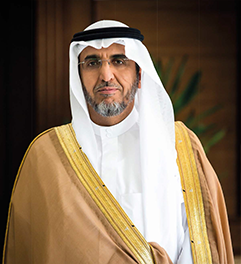Stressing Partnership Methodology with All Concerned Parties,
SASO Governor: No Distinction Between Agents and Importers in Implementing Fuel Economy Standard for New and Used Cars
Governor of SASO, Dr. Sa'ad Al-Kasabi, said that the determined requirements which the importers of used vehicles claimed that they objected to, in a report published in Riyadh Newspaper a few days ago, are additional requirements for importing used vehicles, determining the fuel consumption efficiency for this category of vehicles. These requirements do not include any amendment to the period set to ban the import of used vehicles, which is determined of five years.
He added saying, in a reply received by Riyadh Newspaper, that SASO's Board of Directors accredited the Saudi Technical Regulation No. (2864/ 2015) which is "Saudi Arabia Fuel Economy Standard (SAUDI CAFE) for Light-Duty Vehicles Incoming to the Kingdom of Saudi Arabia (2016-2020)" in meeting No. 149 dated Rabi' al-Awwal 15th, 1436 AH, corresponding to January 6th, 2015, namely a year before the implementation date. This regulation was published in the Official Gazette, Um AlQura, issue No. 4554, dated Jumada al-Awwal 1st, 1436 AH, corresponding to February 20th, 2015.
He pointed out that the Ministry of Commerce and Industry notified commercial chambers officially of the issuance of the Saudi Technical Regulation No. (2864/2015), dated Jumada al-Awwal 21st, 1436 AH, with the report No. 23893.
Moreover, he indicated that the fuel economy standard for new and used vehicles is implemented equally for all importers as no distinction is made between agents and importers in the following:
A. Automotive manufacturers are responsible of reaching the goals of average fuel economy for all new vehicles incoming to the Kingdom, regardless of the identity of importers. Importers, whether merchants or individuals, are allowed to import the same vehicle models available at vehicle agencies. The minimum fuel economy standard is not applicable to new vehicles, considering that new vehicles are also exposed to banning if the automotive manufacturer does not meet the goals of fuel economy.
B. Importer, whoever, bears the responsibility of the compliance of used vehicles with the minimum fuel economy standard.
The Governor of SASO confirmed that the National Energy Efficiency Program implemented, in collaboration with concerned bodies, a two-week awareness campaign a month ago, in which different traditional and modern media channels were used to reach the largest possible number of importers and citizens in order to introduce them with the procedures of the fuel economy standard before coming into force. The campaign targeted citizens and importers of used vehicles. It was distinguished by its use of multimedia to deliver introductory and awareness messages through a number of means and ports, including spreading banners at SASO's vehicle inspection centers and delivering them to Customs to place them at border ports.
The campaign included advertising through several media channels, such as direct ads on the biggest electronic sites for vehicle buying and selling, on the most popular Instagram accounts for vehicle buying and selling, and in promotional campaigns on Instagram and twitter, in addition to a number of television and radio interviews and direct ads in newspapers. Furthermore, an awareness film (infographic) was produced and spread over several media channels. News and journalistic reports were also used in the campaign.
Dr. Al-Kasabi resumed saying that the program has set up a portal to inquire about fuel economy for all vehicles' models from 2011 to 2016. The sources of the data in the database are manufacturing companies of these vehicles and the US Environmental Protection Agency. This data is obtained through bilateral cooperation between both sides.
Moreover, the portal includes a section for communication and comments, whether for the purpose of adding a non-existing model, inquiring about a particular model, or making a suggestion. This is instead of contacting concerned authorities, such as the Ministry of Commerce and Industry, SASO, or the Saudi Energy Efficiency Center. All amendments or proposed additions received through the program will be dealt with and answered within 24-48 hours.
For the benefit of everyone and to make it easier for vehicle importers, Dr. Al-Kasabi noted that all used vehicles bought before January 1st, 2016 are allowed to enter the Kingdom, provided that they reach the Saudi Customs port before March 31st, 2016.
He added that none of the authorities participating in the program have specified any vehicle dealer with meetings to discuss the details of the fuel economy standard without the others. Over 2.000 invitations were sent to most vehicle dealers, agents, and exhibitions to attend workshops held in nine cities, in collaboration with commerce chambers.
Dr. Al-Kasabi concluded by confirming SASO's keenness on having a systematic partnership with all relevant parties, including importers, manufacturers, and traders, as they are the most concerned with the commercial and economic process. In this regard, SASO welcomes all inquiries and comments about any of the issues within its specialization. SASO also reassured that it is committed to serve the interests of the country and citizens.